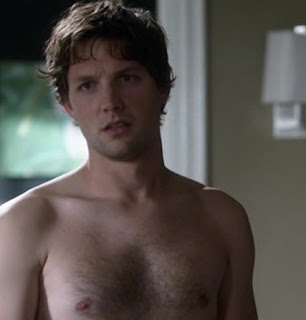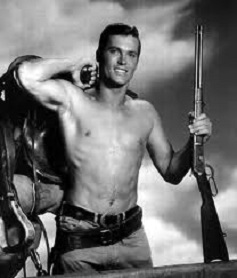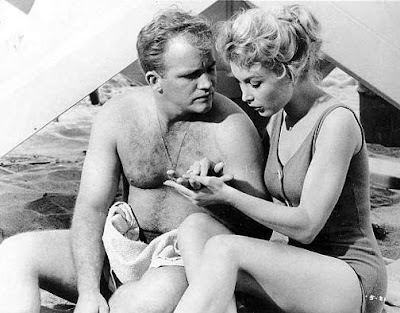I have fond memories of It's Garry Shandling's Show (1986-1990), but I think it's mostly nostalgia for those heady halcyon days, when I first moved to West Hollywood and verything was fresh and new: brunch at the French Quarter, buying books at the Different Light, cruising at Mugi, Sunday beer-and-soda busts at the Faultline, seeing celebrities at the gym, watching It's Garry Shandling Show at someone's house in the Hollywood Hills.
Like Seinfeld, he had a "will they or won't they?" love interest and a dumb sidekick, cute next door neighbor Pete (Michael Tucci). We all assumed that Pete's teenage son Grant (Scott Nemes) was gay.
The only episode I actually recall involved Grant squashing our gay reading by getting a crush on a girl named Shelby Woo, and serenading her with a song parodying the lyrics of "Hooray for Hollywood." That character does not appear in the IMDB cast list, so I don't know which episode it was.
No beefcake, no gay characters. It would have been instantly forgetable, except that it happened to be airing at just the right moment in my life.
After the show ended, I didn't hear anything about Garry Shandling for many years, until word of his death came in 2016. I assumed that he moved back into stand-up obscurity.
In 2020, the It's Garry Shandling Book appeared on Amazon. Oh boy, a small paperback with interesting trivia about the show! I clicked on "one-click ordering" withou investigating any further.
Wow, I was wrong. It's a massive scrapbook with full-page photos, memorials from every comedian you ever heard of and many you haven't, ticket stubs, pages from scripts, newspaper articles, and lots of Gerry's handwritten notes to himself and others:
Being professional is making a commitment to work -- to try your best each time you perform. Being professional is not giving up, quitting, or not caring...remaining unattached yet working and giving and committed all together into one solid continuing performance and non-performance
Everyone interviewed agrees that Garry was the greatest comedian who ever lived, and the greatest guy, witty, erudite, personable, amiable, someone who would make you smile just by entering the room, someone who could cure depression with a hug and turn water into wine. Basically everyone he met wanted to have sex with him,, and he wanted to have sex with most of them.
Strangely, for an "intimate biography," Garry's bisexuality is just hinted at. Actually, there are few references to romances of any sort, in spite of full-page shirtless pics trying to prove that he was handsome, athletic, and generally droolworthy.
I guess a long list of romantic entanglements would clash with his standup routine, which was mostly about how he was too ugly to get women, and too incompetent in bed to keep the few who agreed to date him.
Author Judd Apatow goes overboard trying to convince us that Garry was a famous comedian long before It's Garry Shandling's Show.
In 1977, Michael Hart published The 100: A Ranking of the Most Influential People in History. The Prophet Mohammed got the #1 slot. One gets the impression that Apatow thinks it should have been Garry Shandling.
And It's Garry Shandling's Show -- not a quiet, cute comedian-playing-himself sitcom. It was a work of pure genius. According to the book, it revolutionalized comedy. Garry single-handedly invented the concept of breaking the fourth wall (gee, I thought they were doing that back in Shakespeare's day) and the mockumentary, the basis of every modern sitcom. Without that show, there would be no comedy today. And no documentaries, either.
Let's face it, without that show, there would be no arts at all.
Afterwards, Garry didn't fade into stand-up obscurity. As the most famous comedian in the world, he enjoyed a string of critically-acclaimed masterpieces. He hosted the Grammies -- three times!
He wrote, produced, directed, starred in, did the camera work, and cooked meals for all of the cast and crew of The Larry Sanders Show (1992-98), the second most popular tv series in history.
He starred in the comedic masterpiece What Planet are You From (2000)!
Plus he was a champion of gay rights. In 1993, he was the first person ever to write an openly gay character into a tv series. (gee, I thought that was Soap in 1977).
Apparently there was a gay character on an episode of It's Garry Shandling's Show, also. David Duchovny (later of The X-Files) played "himself" as gay and interested in Garry.
Later in his life, Garry became immersed in Zen Buddhism, and achieved enlightenment. No longer the most famous person in the world, now he was a Boddhisattva, a god.
Garry Shandling is a body-name. A false identity. Let it all go. Be willing to reside ins stillness, needing nothing, wanting nothing, being nothing. All anger and attitudes are false self. Stay in presence. Stay in energy of body. Develop mindful patience. Let go.
Seems a bit incongruous for a guy whose jokes were mostly about getting laid.
Did I mention that I found the book a bit hyperbolic? I'd rather have my memories of a quiet, cute sitcom that I watched at someone's house in the Hollywood Hills during those golden years.




















































